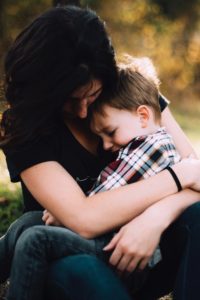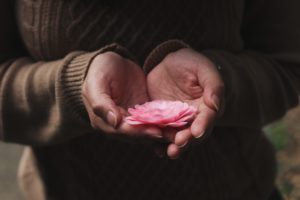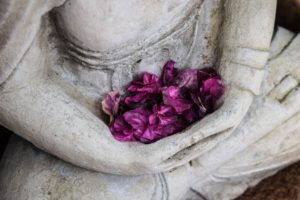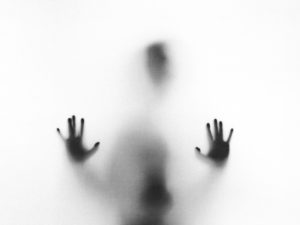by Jenny Rose | May 31, 2018 | Connection & Community, Emotional Intelligence
A couple of years ago my adult son and I had a heated exchange during which I asked him exactly what he wanted from me. It was a useful question. For a moment we stopped being adversaries while he thought about it. “Umm, I don’t know. What I’ve always had, unconditional love, I guess.”

Photo by Jordan Whitt on Unsplash
That moment has stayed with me, because as I asked the question I realized I really didn’t know, and I was both curious and interested. What does a fully emancipated twenty-something-year-old man honestly want from his mother? It was the first time it ever occurred to me to ask either of my sons what they wanted from me at any age or stage.
I never thought of anything except what I wanted to give them.
I’ve been reading about emotional labor recently, which leads me irresistibly to the concept of benign neglect.
Emotional labor is the often invisible process of managing feelings and their expressions as part of a job or relationship. The idea often comes up as part of the ongoing discussion about gender roles and equality, but I’m thinking about it in a slightly different context.
Benign neglect is a term that originated out of city planning politics and now also describes an attitude of inaction regarding an unproductive situation one is commonly held to be responsible for.
I’ve written before about pleasing people, boundaries and reciprocity. Emotional labor is embedded in all of these, and it’s been a primary dysfunction in my relationships over the years, though I haven’t had any language or distinction about my experience of it until recently.
If you Google emotional labor you find definitions, descriptions, assertions about the disproportionate burden of emotional labor on women, and the powerful but invisible expectations regarding who is responsible for emotional labor in any given situation. What you don’t find is discussion about how to make visible and support the vital aspect of emotional labor in community, jobs and families. The discussion stops at equal rights.
Equal rights is an important discussion to have, but in the meantime we’re dealing with families, friends and jobs today and emotional labor is an inescapable need right now.
I think of emotional labor as glue. You don’t see it, but if it’s missing everything falls apart. If it’s applied carefully it holds things together. If we don’t keep a calendar and glance at a clock now and then, we can’t manage our lives. Either we learn to cope with appointments, deadlines, commitments, grocery lists and feelings ourselves or we rely on someone else to do it for us. Part of adulting is learning emotional labor.

Photo by freddie marriage on Unsplash
I’m a button sorter by nature, and I take a lot of pleasure in being organized. My life works better when I take the trouble to be effective and efficient, and it gives me pleasure to share with my loved ones the benefits of thinking and planning ahead and taking care of business. Remembering special dates, buying tickets, planning for bake sales and decorating for the holidays have all been offerings symbolizing my love and willingness to provide support to my family, along with the daily activity of simply showing up in my relationships.
I said that recently to my partner — “this is me showing up in the relationship.” He had no idea what I meant.
I was staggered. What do you mean, what do I mean? You know, asking if you slept well because you didn’t the night before. Or inquiring about the status of that headache you complained about yesterday. Or asking you what’s in your attention and what you’d like to do today. Listening. Sharing. Showing concern. Demonstrating I appreciate you enough to be present. Reminding you that we’re almost out of cat litter. Thanking you for patching the mousehole in the cupboard. Showing up in the relationship!

Photo by Ester Marie Doysabas on Unsplash
Yeah. Aka emotional labor.
He listened and shrugged. I didn’t describe anything he could relate to. He lives his life with me without showing up or not showing up. He just does what he does, says what he says, is interested in what he’s interested in. He doesn’t check in with himself every day to be sure he “showed up” in a way that reassures me of his ongoing affection and caring.
I do.
I’ve thought a lot about this since that conversation. I’ve been conscious of a huge annoyance and, underneath that, amusement.
All my emotional labor is completely unneeded. He never asked me to do it. It’s not useful. It’s invisible to him.
This made me wonder if that’s been true in all my other relationships as well, including with my kids, historically and presently.
That’s not right, though, because I’ve been with some real man-babies. My husband once called me at work because the baby had a soiled diaper. (Okay, it was a real blow-out, but still!) Then there was the guy who wanted a dog to fish with, but didn’t want to walk it, poop scoop after it or stay up all night on July Fourth holding its paw because it was terrified of firecrackers and invariably went into seizures (it had epilepsy).
And then there were the kids. There’s no question at all that raising kids takes a lot of emotional labor. It’s both needed and required.

Photo by Chris Barbalis on Unsplash
I guess I just got into the habit. Emotional labor has been my offering, my contribution, in every relationship. I’m good at it. Until very lately, I never considered reciprocity and I had no definition for emotional labor. I just thought of it as being a good woman.
When my son said he wanted what I’d always given, unconditional love, I had a moment of real satisfaction. I made so many mistakes, but at least I did that right. On the other hand, can those two simple words ever encompass the totality of heart, pain, frustration, energy, loyalty and years they represent? Unconditional love. That’s all.
Right.
I was with a man for a long time who had no interest in emotional labor. Once he had me hooked, he was never decisive, confident or clear again. He initiated no physical contact. He resisted making any plans. He made no effort to develop rituals, routines or regular check-ins. His job was stressful, he had some sleep and health issues, and his favorite excuse was “I forgot.” I gave and he withheld.
Eight years later (slow learner) burned-out, anguished and desperate, it occurred to me to wonder what would happen if I. Just. Stopped.
So I did. I stopped e-mailing. I stopped calling. I made plans without him. I let go of all my expectations and started trying to glue myself back together. I worked, took care of my own responsibilities, enjoyed time with friends and family and went on with my life. I set down all that emotional labor and walked away from it.
Guess what happened?
He floated away.
I’d essentially had an eight-year relationship with myself.
He did eventually (weeks) notice I wasn’t around any more and got in touch, mildly puzzled and reproachful. I was casual and said I’d been busy.
He told me he didn’t feel like he was getting the attention he needed from me. We were sitting in his car at the time. I’ll never forget it.
Until now, I’ve never put that experience in context with all my other relationships. After my recent conversation with my partner about showing up in the relationship, I changed my behavior. I stopped worrying about “showing up” every day. I’ve engaged with my own needs, daily tasks and schedule. I enjoy our time together, but I’ve stopped trying to make it happen. I switched my focus to making sure I show up for myself every day.
What I’ve learned from all this is emotional labor is real and largely unconscious. Many of us give our lives to it. I’ve also learned it’s a choice. When it remains invisible and undefined and we’re operating out of unspoken cultural expectations, we become unconscious of much of our decision-making and motivation. Our desire to be a “good” wife, mother, daughter, lover, sister, whatever, becomes all-powerful and we throw ourselves into it without ever thinking about whether that’s what others want and/or need from us. We don’t consider asking for help or professional support if we’re caregivers. In fact, we feel hurt when our emotional labor of worrying, for example, is not received with gratitude and appreciation! If whoever we’re connected with does want our emotional labor and provides none themselves, we don’t notice. We just work harder.
This is where benign neglect comes in. Benign neglect is an attitude of inaction regarding an unproductive situation one is commonly held to be responsible for, remember? The culture may hold us to be responsible for a lot of things, but that doesn’t make it true.
What if we challenged the “commonly held” belief that all emotional labor is our job in any given relationship? What if we decided it’s not our responsibility, in addition to not being useful, to worry, fuss, organize or manage the feelings of the people around us? What if we took back our power to choose?

Photo by Bruno Nascimento on Unsplash
If I had stopped worrying about doing laundry for my teenagers, or insisting on family mealtimes, or keeping track of their schedules, what then? The sad truth is I was afraid people would think I was a bad mother. I knew I would think I was a bad mother. The kids didn’t do those things for themselves, so I had to do it in order to demonstrate my love, commitment and competence. What kind of a mother lets her kids wear dirty socks?
I didn’t consider the difference between organizing schedules for toddlers and organizing two big, smart, capable boys who saw no reason to bother themselves with boring things like schedules, grocery lists and clean socks. I was so busy demonstrating my feelings, especially my love for them, I never stopped to wonder if they were learning to express their feelings. I didn’t ask.
It annoys me that only now am I seeing ways in which I could have been a much more effective parent, partner, daughter and sister.
At bottom, I don’t think emotional labor is about equal gender rights at all. I think it’s about choice, and choice is about power. We can’t choose if we don’t recognize there is a choice, we can only stumble forward blindly, doing our best with what we think the rules and expectations are, external and internal, until, overburdened, overwhelmed and exhausted, we fall down and don’t get up again. Meanwhile, the people we love, the ones we’re doing all this labor for, are not saved by our labor. Kids grow up, have car accidents and bad relationships, choose crappy diets, fall into addiction, catch an STD. Parents grow old, have health problems, and become dependent. Siblings, friends, lovers and mates are not assisted by our worry, our ability to manage their feelings or our “showing up” in the relationship. All our loved ones might be a great deal better off if we hadn’t taken on all the emotional labor ourselves, because when life happens, as it inevitably does, they lack the skills we never let them learn because we were so busy being good women.
Also, when was the last time you were thanked for all your emotional labor? (What do you mean, “showing up” in the relationship?)
You gotta love the irony of the whole thing.
What would my relationships look like if I kept my emotional labor in balance with the labor of those I’m connected to? What if I could be more like my partner and trust that my affection and love for him (and others) are communicated and understood without such deliberate emotional labor? He just naturally demonstrates his feelings for me in our day-to-day life without all this effort and trying. What if I relaxed and redefined what being a “good woman” means?
I’m going to find out.

Photo by Ryan Moreno on Unsplash
All content on this site ©2018
Jennifer Rose
except where otherwise noted
by Jenny Rose | May 24, 2018 | Emotional Intelligence, Feelings
Sometimes being a writer is a pain in the ass.
I had several ideas for this week’s post, but when it came down to it all I produced was something I didn’t want to think about, remember or write about at all. I tried to stop and go back to one of my original ideas, but no matter where I went I ended up in the same place.
I’m old enough to know it’s much easier to ride the horse in the direction it’s going, so I’m writing the damn thing, but I want you to know I’m resentful about it.
Two seeds contributed to this piece. The first is that my partner will be attending his fiftieth high school reunion this summer, and deciding whether or not to accompany him has been a thing for me.
The second seed is the latest (as of this writing) school shooting in Santa Fe, Texas, and the story about the girl (who was killed) who allegedly rejected the shooter and how that may or may not have been part of the motive.
I don’t know what happened between these two young people, of course. I certainly don’t believe everything I read. Perhaps the shooter was bullied. Perhaps he wasn’t. Maybe the girl simply said no, and some people interpret that as bullying. Maybe he refused to take no for an answer and the girl was trying to get the message across with ever-increasing force. I’ve been in a position like that myself. I don’t know, and for the purposes of this post it doesn’t matter.
I think we all can agree we have a problem with school shootings in this country, even if we don’t agree on causes and solutions. I also believe the data gathering, debate and problem solving around this issue is extremely important. Along with everybody else, I have my own opinions about how we got here and what we might do about it, but my opinion isn’t part of this post, either.

Photo by Alex Iby on Unsplash
The reason I’m writing about it (the shooting, one of the alleged triggers for the shooting, and the entire problem of school violence) at all is because of the way it makes me feel.
Sick. Sad. Scared. Angry.
These are the same feelings I’ve had about the entirely trivial decision about whether or not to attend my partner’s high school reunion.
My days in high school were a black time I’ve worked hard to forget. I led a strangely reversed life then, like a photographic negative. My real life was the volunteer fire and rescue work I was doing, my family (including many animals) and reading, the frame around the central core of school. The fire and rescue work often took place at night, of course, and I well remember the fellowship, the macabre hilarity, the practical jokes, and the heartbreak, terror and death we saw on the highway. There were impromptu middle-of-the-night meals at Denny’s after delivering a patient to the hospital, when we were stinking of gasoline and had glass splinters in the knees of our jeans. I was the baby, the youngest, but I was trained and certified and did everything I could to pull my weight.
It was the first time I ever felt I belonged anywhere, or was of any use to the world.
School days, by contrast, were endless bleak hours of clocks, bells, the metallic slam of lockers, figuring out what was necessary in order to maintain straight A’s (which thankfully did not involve much attendance in most cases), and fatigue.
I can’t remember eating a single school lunch in either junior high or high school. Isn’t that strange? I must have, but I have no memory of doing so, or of the cafeterias. What I do remember is the high school library, where there were rows of study carrels — remember those? They were 3-sided square boxes on the desks so that each student was cut off and private, in his or her own little undistracted and unobserved space. I had one particular favorite, the farthest away from the librarian and activity, out of sight, out of mind. It was where I slept. I wore an old hand-me-down men’s quilted navy blue coat that I cherished, and I wadded part of it up as a pillow, pulled the rest over my head and slept for long stretches through lunch and classes.
I was (and am) very organized. I knew what my teachers expected. I always showed up for tests and did all my homework. Papers and projects were planned and completed well before they were due. I did all the reading, homework and classwork. If extra credit work was available, I did that. When I could take AP classes, I did. I never ditched AP English, which I loved. I also went to Latin, another favorite. German was fun, too. I was never any kind of a problem, in class or out of it. Most of the time, I was numb with boredom.
I wished only to remain invisible and maintain a 4.0 grade average. The invisibility was for myself. The grade average was because it was expected of me, and it was easier to just do it than to rebel. Also, I wanted to be finished with school as soon as possible, and the quickest way out was to pass all my classes.
Most of the teachers and all of the students were alien species. I moved among them like a ghost, a wisp of fog. I hardly opened my mouth. I occasionally raised my hand in class for the teachers who required participation for an A, but I’d learned in grade school not to volunteer too many answers, even if I did know them. I dawdled over my tests so as not to be the first one finished. I took pains to keep most of the teachers at a distance so as not to be identified as a “teacher’s pet,” another lesson from grade school.
I was never bullied, though I saw and heard bullying every day. I was adept at blending in and attracting no attention, positive or negative. I didn’t hate the other kids. I didn’t think much about them at all. I didn’t hate the teachers. I even respected a couple of them. I was angry all the time, but it wasn’t focused on anyone in particular, and I only recognize it in retrospect. I didn’t blame the teachers, the kids or my parents for the hell I was in. It never occurred to me there was any other option. Everyone had to go to school, period. My parents were busy people with lives of their own. There wasn’t anything they could have done and I saw no point in whining and complaining.

Photo by Milada Vigerova on Unsplash
The school day was bracketed by a 40-minute bus ride morning and evening, and I did my homework on the bus, which effectively shut out the noisy horseplay, teasing and other socialization happening on it. I always chose a window seat somewhere in the middle and immediately set to work, never looking up from my notebook and books even if someone sat down next to me. If I had no homework, I read.
When I was a senior I finally learned to drive, somewhat unwillingly. I’d seen too much trauma on the highway by then to be enamored of driving. In the end, though, I learned and sometimes I drove our old Chevy truck to and from school, a battered tank of a thing that could cope with any kind of weather and wouldn’t crumple like a tin can at the slightest bump or ding. It was a faded brick red. If I had the truck, I abandoned the library and stretched out on the seat to sleep after parking on a quiet side street, cracking the windows and locking the doors. It felt very safe.
I do remember, as a great treat to myself, buying lunch in town when I had the truck, either at McDonald’s or a little health food store that made wonderful egg salad sandwiches.
Sick. Sad. Scared. Angry.
I remember one student I graduated with. One. I think I remember him because he was also a friend of my brother’s, who was a year behind me, and he was on the summer swim team with me. He was in my AP classes and became a scientist. He wasn’t a friend. He’s just the only one I remember.
On the other hand, I remember the fire station very well, and the rescue barn. I remember the smell of exhaust from the ambulances and big trucks. I remember the little offices where the phone and radio sat on the counter. I remember the meetings, the folding chairs, the scarred tables and the pancake breakfasts. I remember the battered coffee urns and the stained sinks, the water fights, the endless and hilarious practical jokes, the laughter, the weekly meals at the local diner, the parties, the trainings and the people. I later married two of the men I volunteered with in those days (not at the same time, of course!) I remember running up and down ladders for training, the impossible weight of portable water pumps (we called them Indian pumps) for fighting brush fires, the eerie sight of burning trees crowning in a blossom of flame against a dark sky and watching a house burn to the ground. I remember the sour smell of cooling “hot spots” after a brush fire. I remember the live feeling and weight of a charged firehose, enough to knock me over, and the way it peeled the shirt off you during a water fight.
For this treasured, meaningful part of my life, though, there was no acknowledgment. Rather the reverse. It wasn’t quite nice, a teenage girl running around with a bunch of older boys and rowdy, often bawdy volunteers, never mind that I took First Aid, CPR, EMT and IV training and loved it all. It also meant I occasionally showed up in the company of the police at wild parties where someone got hurt or overdosed, which did not endear me to my high school peers. Not to mention that the first dead body I ever saw happened to be one of my schoolmates. I’ll never forget the broken-doll look of him as he lay on the highway, broken glass glittering in his hair under the emergency lights. The only reason it was possible for me to do that work was that my mother did it too. She was quite a good paramedic, in fact.
My experience with high school took place in the late 70s and early 80s. We had a completely open campus. Certainly, things are different now in terms of security, at least. I wonder, though, how many kids are sitting in public schools across the country this very minute who are largely unseen, unheard and simply trying to survive.
Every time a shooting happens we get hours and hours of interviews, social media posts and videos of parents, teachers and students and their perceptions of the perpetrators, and I always wonder — did anyone, does anyone, can anyone really know their student, brother, son, teammate or classmate? How well does a high-school-age kid know him or herself? How much perspective can they have, how much experience in the amazing ways life can change over time? What has been their experience of connection with themselves and others? What is the level of their willingness and ability to communicate? Have they ever, in their whole lives, been given a reason to believe asking for help or telling the truth is useful, rather than making everything much, much worse?
My family cared about me. I remember going to counseling once or twice, both in school and out of it. Do you know what happens to kids who get in-school counseling? They get pulled out of class, right in front of God and everyone. Every single student and teacher in that class knows where they’re going. Not exactly a help when you’re trying to remain invisible. Also, the counselors are just as worn-out and frayed as all the other adults in a school, with an endless array of troubled kids, emergencies, difficult or distraught parents, and they’re trying to support the teachers as well. I was ashamed to be part of their burden and take up any of their time.

Photo by John Salvino on Unsplash
We say some of these at-risk kids who become shooters are identified and “in the system,” and I think many components of “the system” have an honest desire to make a positive difference and work usefully with young people. That doesn’t mean the young person is able to avail him or herself of the support, though. I trusted no one at that point in my life. I wouldn’t have ever told the truth about my private thoughts and feelings. I’d already learned the danger of rocking boats, and I also knew I was privileged because I was smart, we were comparatively wealthy and I had a family that loved me. I had nothing to complain about, and I didn’t. Nothing would have induced me to shame my parents and my extremely intelligent, talented and much more normal and attractive younger brother.
Now, thirty years later, kids are dying, and teachers, and school staff, as well as an occasional parent. We’re trying to understand. Some are trying to find someone to blame, as though that fixes things. But the parents of the shooters aren’t killing these kids. Neither are teachers or security personnel. Bullies and peers aren’t killing these kids. “The system” isn’t killing them, either, or the NRA. The one who pulls the trigger is the killer. I think it’s important to be clear about who’s ultimately responsible. The question is, what came before the trigger was pulled? What are all the intricacies and complexities leading to that moment of choice, and how do we begin to explore that terrain without the input of the shooter, who might or might not survive, and if alive, might or might not tell? If we can ever fully understand, how do we make changes in the roots of parenting, emotional intelligence (or lack thereof), public education (so-called), and our culture’s broken sense of connection and ability to be authentic?
If my school records could be magically produced, what would they show? Straight A’s. Honors student. Maybe a counseling note or two: Isolated, frequent absences, no behavior problems, no sign of abuse or cutting, not a danger to self or others,

Photo by Joshua Fuller on Unsplash
People, that’s a paper doll, not a person. I’m smarter than most people I know. If I’d been a danger to self or others (and I was a certainly actively suicidal), do you think I’d have told anyone? Come on. I know we have social media now, but how much of what shows up on a teen’s social media is Truth? Teens compete, exaggerate, dramatize and make stuff up, just like the rest of us. Often there are clues, but they’re a lot easier to see after the fact, and that’s not much help, is it? It takes years to develop self-knowledge and insight, even if we’re willing to.
Sick. Sad. Scared. Angry.
I’m a parent. When my two sons were teenagers, I worked at the same school they attended. It was a small school and I knew every student, every staff member and most of the parents. I had a whole reality in my head about who my kids were and how they were doing. I loved them with my whole heart. I absolutely trusted them. I frequently knew when they were ditching school, smoking weed or leaving the house in the middle of the night. I didn’t bail them out of consequences or micromanage them. I was a single mom, working desperately hard to keep us afloat and trying to deal with my own experience.
I knew I wasn’t okay, but I wanted to believe they were. I was doing the best I could, loving them as hard as I could and making sure they knew it.
They did know it, just like they knew I wasn’t okay. They weren’t okay, either, but they knew I was doing my best, they didn’t want to burden me and they didn’t really know what they needed for things to get better anyway. Exactly the same position I’d been in two decades earlier.
The truth is, given the right circumstances, either of my boys could have been victims — or shooters. So, in fact, could I. That’s a hard thing to believe and a harder thing to write, but it’s true. Every single one of us has a snapping point, whether we admit it or not. High school can be a place of prison and torture, a place of no hope, an infinite incarceration, a daily experience of humiliation or fear. It can be a nihilistic experience, a daily exercise in powerlessness, in making oneself small, in concealment, in survival.
Sick. Sad. Scared. Angry.
And then there’s the other side of high school. Some amazing people in every class go to endless work and trouble to keep track of their classmates and plan and organize class reunions. For someone like me, this is both astounding and appalling. When my partner told me about his reunion this summer and asked me to come with him, it took me a minute to understand he was serious. Sure, and then can we go get our legs chopped off with a dull blade? Please, oh please?
But I know many people have great memories of clubs and sports teams, teachers and classes, proms and homecomings. My partner has lifelong friendships from high school. Imagine it, 50-year-old friendships! I met my closest friend when I was 30. What would it be like to have that kind of history with another person, that kind of intimacy? What would it be like to know someone liked you enough to be friends with you for 50 years?
Sick. Sad. Scared. Angry.
High school. Guns and reunions. Looking for quick, inexpensive, politically attractive fixes. Heated debates. Demonstrations and walk-outs. Active shooter drills for schools and law enforcement and mass trauma drills for hospitals. Blameshifting, fear, mistrust, profiling. Blood, vigils, funerals and graves. Bullying, mental illness and lasting trauma. Lost kids. Disconnected kids. Dead kids.

Photo by Cristian Newman on Unsplash
The cacophony of debate, press conferences, social media, opinions, interviews, political maneuvering, nonstop news feeds and raw videos goes on and on, and somewhere in the center of the maelstrom is the core of the problem — the young people who shoot, who die and who witness. Some of them have been swept into the hurricane, but I wonder how many are simply sheltering in place, trying to survive another bewildering, hopeless, pointless day of tech, teachers, rules, grades and peers. I know they’re there, because I was one. They could tell us a lot about futility, despair and disconnection. They’re keeping painful secrets. Are we willing to hear their truth? Do we deserve their trust? Do we have time or energy for them? Can we change anything for the better? Or would we tell them to get over it, that everyone has to do things they don’t want to do, that high school will be over one day? Do we paste a neat label on them and write a prescription? Do we insert them into a “system,” because that’s the best we have, and turn away to deal with our own jobs, responsibilities, stresses, scar tissue, labels and prescriptions?
I’m back where I started.
Sick. Sad. Scared. Angry.

Photo by Aimee Vogelsang on Unsplash
All content on this site ©2018
Jennifer Rose
except where otherwise noted
by Jenny Rose | May 17, 2018 | Contribution, Emotional Intelligence
The seed for this post was a podcast by Pat McCabe, also known as Woman Stands Shining, who is a Diné (Navajo) mother, grandmother, activist, artist, writer, ceremonial leader and international speaker. In the podcast, she speaks about the idea of making an offering as part of our spiritual work.

Photo by Chinh Le Duc on Unsplash
That idea started me thinking about offerings, what it means to make one, to whom we make them, and why. Spiritual and sacred practices are a strong theme in my Webbd Wheel series. Mother’s Day has come and gone and Father’s Day is ahead. Many of us mark these days with offerings of some kind. For Earth Day, I joined a small neighborhood group and picked up trash, and I framed that activity as an offering. Yesterday I cleaned up my summer-only dance space and danced there for the first time this season. As so often happens, during that hour of dance this week’s post crystallized.
An offering is “a thing offered as a gift or a contribution” according to a quick Internet search. A gift is “a thing given willingly to someone without payment.”
The act of making an offering is ancient, a practice we began long before we could go out and buy a gift. Various cultures have historically engaged in ritual sacrifice (an act of slaughtering an animal or person or surrendering a possession as an offering to God or to a divine or supernatural figure), an altogether different degree of gift from a cute coffee mug.
I’ve long struggled personally with gift giving. There’s something in me that resents and resists the cultural mandates we’ve created to give gifts of a particular kind on certain occasions or days of the year. It seems to me modern-day gift giving has moved away from making an offering and into a demonstration of possessing money and spending it on some new piece of something, just for the look of the thing. We may feel real love, or gratitude, or whatever, but the only way we know how to express it is by buying a card (never mind the trees) and some kind of a gift.
I know that’s how we do things, but what does it accomplish, aside from contributing to our capitalist economy? Is that what we most want from the people in our lives — more stuff — or is that what we take because we can’t get what we really want? Is a coffee mug all we think we have to offer? Is a coffee mug all we think the other will accept? Are we unable to recognize and cherish an offering unless it comes gift-wrapped?

Photo by Chris Ensey on Unsplash
I’m thinking a lot about Pele, the Hawaiian volcano goddess, because I’m writing about her in my second book. Traditional offerings to Pele included tobacco, brandy, silk, crystals, tropical flowers and food. Offerings to Pele and other divine figures around the world involved ritual, prayer, music, song, dance and sometimes a sacrifice. Things, yes, although many were consumables or objects from the natural world, but also time. Presence. Creative, sensual and/or erotic expression. Community celebration, guided by spiritual leaders. Reverence. Appreciation. Gratitude. Acknowledgement of the Divine’s connection to the people and the natural world they inhabited.
Making an offering on this level is a demonstration of commitment and willingness to participate in the complex web of connection between people and nature. It’s a practice, not a one-time event. It’s flexible and not limited to the calendar or the clock. If there’s a community or individual need to speak to the Divine, time is set aside to do so. No money or commerce need be involved, because the offering is of self.
The offering of self, however, is often invisible, especially to our nearest and dearest. It’s so fatally easy to take one another for granted. The very act of feeding those we love is an offering we’ve been making and accepting since humans began. The acts of growing, harvesting, gathering, hunting, sharing and preparing food, absolutely necessary for survival, are almost obscured now by money and time constraints, ecological concerns, health issues, ideology and who does the dishes. Whether we recognize it or not, feeding another person is an offering of life. Parents know making that single offering to just one child, let alone other family members, is a colossal, exhausting, unending task. Yet it’s so often completely invisible, and who has time to enjoy the act of offering food to another (or ourselves, for that matter), or incorporate ritual, play or creativity into our eating? It’s just another chore in our busy days.
So, if our offering is invisible, unrecognized, unappreciated or even rejected in favor of something like a coffee mug, does it mean we’re worth nothing, we are nothing?
Of course not, but it feels that way sometimes, doesn’t it?
Making an offering means letting it go into the world and having faith in its worth. An offering is a gift, and a gift is a thing given willingly, without payment, remember? There isn’t a scorecard. It’s the practice of offering that enriches our spirit, not the outcome. Unfortunately, everything about our modern culture trains us to depend on immediate reinforcement. We’re hooked on likes, claps and our stats. We gloat over the number of our friends, subscribers, comments and shares. Deadliest of all, we compare our popularity and performance with the popularity and performance of others.
What others think about us and how the world perceives us is becoming more important than our own integrity and the authenticity and quality of our offerings. We’re forgetting how to trust and have faith in silence, in invisibility and in not knowing. We’re forgetting our worth is not defined by others.
What about the offerings we make to ourselves? What about our ability to meet our own needs, spiritual, physical, creative and emotional? Do we have any self to give ourselves? Do we tell ourselves there’s no time, no money and no point? Do we tell ourselves whatever our self-expression is, it’s not worth anything, meaning we can’t sell it to someone or no one will approve of it?

Woodshed
I danced yesterday in an old woodshed that was attached to a local one-room schoolhouse more than 100 years ago. It leans and tilts. The roof leaks. The windows and doors aren’t square and the wind blows through gaps. I swept out the winter’s accumulation of mouse and bat droppings, leaves and dirt. It was a warm, sunny day and as I danced I gradually peeled off my clothes until I was naked. The sun came in the west window and made a square on the floor.
I thought of trees and stones offering their bodies to moss and lichen, the earth offering itself to plants, and blossoms offering themselves to sunlight and insects.
I thought of smiling into a stranger’s eyes and complimenting a cashier on the color of her blouse.
I thought of the creators of the music I was dancing to making an offering of their talent, enabling me to offer my dance.
I thought of homes, rooms and gardens I’ve created that are long erased. I thought of people I’ve loved with my whole heart and volunteer work I’ve done. I thought of my partner, who was running an errand in town so I could eat bacon the next morning. I thought of picking up trash on Earth Day and the new trash that’s been thrown out car windows since then, and how futile that makes me feel.
I thought about words, all these words, all these stories and ideas and thoughts in my head that are here and in my books. I thought about all the words written by others I read each day and appreciate and share.
I thought about procreation, the red tide and the milky seed our bodies offer to life, to hope, to continuance. I thought about offerings of tears, of blood, of pain, of rage and of surrender.

Photo by Leon Liu on Unsplash
Offering is a circle. Life offers itself to us, and we can choose to offer ourselves to Life. What better offering can we make than our fully engaged participation and presence with ourselves, our experience and others? Such a gift can’t be bought or sold. It might not feed our fame, popularity or bank account. We probably won’t get validated by statistics or Twitter. Some people may never recognize or value it.
But our self-esteem will bloom. Our joy will increase. Our words and choices will add to the positive energy in the world. We will become self-empowered and spiritually strong and resilient.
I smiled and laughed and shouted as I danced, whirled and stamped and clapped. I offered up my white, winter-tender skin to the sun and air. A mosquito bit me on a knee; a blood offering. No one saw me, except maybe an astonished spider or two. No one cared. It was an offering of self to self, a private thing. It gave me joy. It gave my body a chance to move and be grateful. It fed my creative well.
It was nothing.
It was everything.
It was my offering.
All content on this site ©2018
Jennifer Rose
except where otherwise noted
by Jenny Rose | May 10, 2018 | Connection & Community, Emotional Intelligence, Shadows
Slowly, I’m finding online communities of writers. As I’ve shaped Our Daily Crime, I’ve connected with other bloggers. These connections mean I spend at least an hour a day reading the work of others. I’m inspired, touched, tickled and provoked, and I feel at home in these digital communities because we all share the need to write and be read. We also share self-doubt, confusion, vulnerability, loneliness, the need for connection and the problem of earning a living.

Photo by Volkan Olmez on Unsplash
Over and over again, I read about personal struggles with depression, fear and anxiety. Many a writer sits down to their daily writing practice with goals and intentions and finds him or herself unable to do anything but express the here and now of their experience of ambivalence, avoidance, distraction or block. To be a writer is to occasionally live with shame and guilt about what we meant to write, what we should have written and the quality and subject of what we actually did come up with. We all doubt our ability, our value, and whether anyone will care enough to read our words. Creative expression is a daily leap of faith.
I’ve struggled all my life with depression. In more recent years, I’ve come to understand anxiety and fear are also large parts of the feeling I recognize as depression. Over the years I’ve tried to manage depression in many ways. Some worked, at least temporarily, and some didn’t.
It hasn’t been until the last decade that I’ve finally found a way to effectively manage and even largely banish depression. It doesn’t play with me anymore. Fear and anxiety still show up regularly, but the same method works to manage them, and I no longer worry one day I’ll just give up, step over some unseen edge, and disappear into crazy, a fugue state, or death.
One day, for no reason in particular except I felt exhausted, despairing, and bored with both, I said to Depression, “You win. I give up. Why not come out of the shadows and show yourself?”
Fat and happy, secure in its power, it did just that.
The first thing that I realized was Depression is an experience, not an integral piece of me. It’s something draped around me. It can be separated from me.
The second thing I noticed was my depression is male. He walked with an arrogant male strut and swagger and he spoke in a male voice.
I didn’t name him because he wasn’t a pet, he wasn’t a friend, and he most definitely wasn’t invited to be a roommate. He was merely someone who showed up at more or less regular intervals and made a nuisance of himself. He didn’t have the manners to knock on the door, wait to be invited or give any notice of his arrival. He just appeared.
I wondered what it would take to discourage him from visiting. What made me so attractive?

Photo by Stefano Pollio on Unsplash
Clinical depression is like a grey cave filled with fog. It numbs the senses and fills head and heart with cold, sticky, lumpy oatmeal. One is entirely alone with no hope. The simplest action, like opening one’s eyes, takes enormous effort. Depression envelopes and consumes every spark of power.
The only reason I’m in the world today is because I’m an unbelievably stubborn butthead. I’m also very nice. One does not cancel out the other, but nearly everyone persists in missing that second important point, with the result that I’m constantly being underestimated. This is a wonderful advantage in life.
Depression was no exception to the rule. When invited, he disentangled himself from me, parked his butt in a chair I pulled out for him, and began to tell me how things were going to be from now on.
On that particular day, I hadn’t showered (or the day before that, or the day before that). Annoyed by his high-handedness, I interrupted to say I was going to shower. He told me not to. Who would care? What was the point? I wouldn’t see anyone. No one would see me.
That was all I needed. I went and took a long shower. Washed my hair. Shaved my legs. Put on clean clothes and some jewelry. Depression sat in the bathroom and muttered at me. I ignored him.
I felt better then, and my irrepressible creativity began to stir, along with a childlike streak of playfulness I usually keep well-hidden. One small act of rebellion had helped me regain a tiny sense of power.
One of the things that used to happen when depression struck was that I stopped eating. I’d go all day with nothing but a salad and a piece of toast. I hadn’t eaten a solid meal for several days on this occasion. I wasn’t the slightest bit hungry (this is common), but I knew I needed to eat.
Depression didn’t like it. He threatened and complained and trotted out all the usual points. I was too fat. I hadn’t been doing anything useful and didn’t need to eat. I didn’t make enough money to deserve to eat.

Photo by Florencia Potter on Unsplash
I put a chair at the table for Depression (I lived alone at the time), invited him to sit, set the table for two with complete place settings, right down to two glasses of water, made myself a meal, and ate. I offered him some food, but he refused. I read while I ate and ignored Depression, who sat and sulked.
Well, you have the idea. The more he protested when I wanted to take a walk, sit in the sun or work in the garden, the more stubborn I became. I politely invited him to join me in my activities, but he refused, which meant the more I got out in the world and did things the less time I spent with him. He hated my movies and my audio books. He thought walking to Main Street for an ice cream cone was a criminal waste of money, along with feeding the birds. The only activity he approved of was my work, which involved sitting for hours in front of my computer with headphones on doing medical transcription as fast and accurately as possible for only slightly more than minimum wage.
He absolutely hated my music. I quickly developed the habit of turning on Pandora first thing every morning and listening to it most of the day.
We also conflicted over sleep. Depression said there was no point in getting up in the morning because no one would notice. No one would care. In fact, the only things really worth doing in life were working and sleeping. This attitude ensured I set the alarm for 5:30 a.m. and walked every day at dawn.
I didn’t ask him to leave. I didn’t fight or struggle. I made sure he had plenty of space and a good pillow in my bed. I gave him a spot at the table and a seat in front of the TV. I took out a clean towel for him and invited him to browse in my personal library.
Every single time he told me not to do something I did it, no matter how much I didn’t want to. I was pleasant, noncompliant, resistant and stubborn as a mule.
You know what?
He went away.
One day, he was just gone.
I knew I’d found the key.
Externalized, Depression suddenly became more pathetic than terrifying. He was so predictable, and so limited. All he had to say were the same things he’d been saying all my life. He was boring. He was like a batty old uncle who must be invited to every family gathering and tells the same interminable stories year in and year out.
He came back, of course, but for shorter and shorter visits at wider and wider intervals.
“Back again, I see,” I’d say. I’d set a place at the table, take out a clean towel, make space in the bed and on the couch. I’d realize I was sliding again and concentrate on eating more regularly, exercising, playing music, putting flowers on the table or maybe scheduling a massage.
I tried to have conversations with him, but Depression had no conversation, just the same tired monologue, mumbling and whining. He was really quite sad. He stopped spending the night and then gradually stopped visiting altogether.
I guess he was no longer getting what he needed from me.
Fear and anxiety are still regular visitors. Things are different here in Maine. I don’t live alone, for one thing. I still play imaginary games, but only in my head. Still, when either fear or anxiety show up, I recognize them. (Anxiety bites her fingernails; I always recognize her hands.) I don’t try to keep them away and I don’t try to hide from them.
I focus on giving them no power. I don’t buy into their catastrophizing. I appreciate they’re trying to keep me safe, poor things. All they can do is make up terrible stories about what might happen and then sit, paralyzed by their imaginings. I know they’re wretched. I wish I could help. I try to be kind — at a distance. They usually don’t stay long.
This experience is the sort of thing I used to hide, but I realize now my struggles are not unique. I’m inspired by the creativity, honesty and vulnerability of other writers. Coping with depression, anxiety and fear is like figuring out how to eat. Every body is different. Everybody needs to find their own path to healing, health and sanity. At times, it’s difficult to break through social expectations and shoulds and make a complete left turn into something creative, intuitive or outside the current norms.
Still, nothing succeeds like success. Turning Depression into an externalized character helped me see I didn’t have to define myself by it. I could choose to set aside that label and all it implies. Once I truly believed I had the power to choose, everything changed.
Sometimes, running away from sudden or passing danger is appropriate. However, running from these chronic spectres dogging my heels has not worked. I can’t get away from them. I can’t avoid or evade. Being chased by anything is fearful. The moment when I stop running, turn around and deliberately go toward whatever threatens me is the moment in which I begin to regain power. Monsters suddenly become mice. My own fear and abdication of power are what made them monstrous. I don’t need to hide. I don’t need to defend. I only need to consistently and patiently demonstrate I will give them nothing they want so they choose to leave me.
It helps when they tell me what to do.
Don’t tell me what to do!

Photo by Senjuti Kundu on Unsplash
All content on this site ©2018
Jennifer Rose
except where otherwise noted
by Jenny Rose | May 3, 2018 | Contribution, Emotional Intelligence
Years ago, during a conversation about men, a girlfriend of mine said, “You have to kiss a lot of frogs.” It was the first time I’d ever heard that observation, and I’ve never forgotten the way it made me smile. Now, it’s all over the Internet, but then we weren’t numbed by such a constant bombardment of memes and phrases.
One does have to kiss a lot of frogs in life. Roommates from hell, jobs we hate, the nether regions of those more powerful than we are, all require a certain amount of kissing. Then there are sticky-faced children kisses; big-hearted sloppy dog kisses; and, my personal favorite, sandpaper cat kisses that remove the top layer of skin from one’s nose.

Photo by Andreas Fidler on Unsplash
The central preoccupation of kissing, of course, is the “romantic” kiss. We quickly learn that some kisses are more romantic than others. A lot of our personal kissing history is hurriedly filed away under the label “What Was I Thinking?” and we try to forget about it.
When I really consider it, I realize we spend much more time kissing frogs than anything else. Someone should write a manual. (Poor little frogs. I’m very fond of them. I wonder if they have metaphors about kissing princes in hopes they turn into frogs. It would only be fair.)
Leaving an old, familiar place and coming to a new one reminds me how many frogs are out there, waiting to be kissed, especially in this season when the night shrills with the insistent songs of a variety of species from tiny peepers the size of a thumbnail to enormous bullfrogs. I’ve kissed a lot of frogs trying to make new friends. I’ve kissed a lot of frogs trying to find someone to cut my hair, a massage therapist, a dentist, a doctor, and a health food store.

Photo by henry fournier on Unsplash
Kissing frogs takes time, and I get discouraged. I’ve never been comfortable socially. I hate trying to make a connection with strangers. I know intellectually that for every ten times I reach out to another, nine times it will be another dead end, but the tenth time something wonderful will happen. Persistence and patience do pay off.
I’ve spent my life with books. I was reading before Kindergarten (thank you, Richard Scarry, Mom and Dad). Our home was always filled with books. I have a library degree and I’ve worked in a public library and an elementary school library. In my old place, I did volunteer work for a used bookstore run by the local Friends of the Library.
I came to Maine with more than 30 boxes of books, and that was after a severe culling. My partner has at least as many books in his own library. This old farmhouse is positively groaning with our combined libraries, and we’re in desperate need of more shelving. I was disappointed to find a less robust library program than I was used to in the nearest town, and no bookstore of any kind. My first year here, I did hear of a used bookstore in a college town about 30 minutes away, and my partner and I agreed we’d go check it out.

Photo by Jazmin Quaynor on Unsplash
Three and a half years later, I finally made up my mind to stop shillyshallying around and go find that bookstore. I made a date with myself, pulled out maps, informed my partner I was going, dammit!, and we went.
Heaven. Bliss. Home. Shelves and boxes and unstable stacks of books on every surface. Hundreds of books. Thousands of books. Chairs and stepstools and round stools. Old encyclopedias. Children’s books. A huge table covered in a tornado of books.
I headed for the farthest back corner and started working my way forward through nonfiction hardback, plays, poetry, and then fiction.
A long time later, I went in search of the store owner, who was talking with my much more gregarious and extroverted partner in the casual fashion of men getting to know one another. Without preamble, I asked the owner if he had any use for a volunteer experienced in library and bookstore work. We were standing in a room I hadn’t explored yet that looked as though it had been the site of an explosion. Later, I found out a pipe had burst and flooded the place.
He thought this was a fine idea, and said I could start that minute. He also said he’d pay me in books (I made a valiant effort not to drool in front of him). I didn’t want to start that minute, so I declined, and I could tell he thought I didn’t mean it, not really. I said we’d talk. I went back to browsing, smiling to myself.
A couple hours, a heavy box and $145 later, we emerged, happy and grubby. I’d made a date to return, but the owner didn’t think I really would.
On Monday, as promised, I returned precisely on the dot of 12:15 p.m., the time he requested.
He’d hurriedly emptied several bookcases at the time of the flood, and disassembled shelves to get them out of the way. He’d been working to get the shelves back up and wanted me to load them. I asked if I could wipe down the shelves first. A raised eyebrow and surprised agreement. He found a bucket and a rag and I got to work while he searched among towering piles of heavy boxes for the books that belonged on the shelves. This was the general fiction mass market paperback section. He wanted me to weed out science fiction, fantasy, horror and mystery for other sections. He also wanted me to weed out duplicates, choosing the best copy for the shelf.

Photo by Syd Wachs on Unsplash
So began four glorious hours of squatting, bending, kneeling, sorting and alphabetizing. A bookstore invariably reflects the place it’s in. In Colorado, we had a Colorado section, naturally, featuring Colorado authors and artists. We also had a big Western section featuring Louis L’Amour and other Western writers. In Maine, there’s a Maine section and history and biography focused on the founding of the colonies, mills and seafaring. Also, a lot of political nonfiction.
The fiction is heavy on Richard Russo, Bill Roorbach, Annie Proulx and other Maine writers, as well as, of course, shelves of Stephen King.
I emptied box after box. I filled one of the empty boxes with duplicates and started another. I made leaning piles of mystery, fantasy and science fiction for other sections. Customers came and went, stepping around my boxes, bucket and piles, browsing with the quiet intensity of true booklovers. Robert, the owner, moved boxes around, answered the phone and hummed under his breath. I put aside a few books I wanted to take home.
Four hours passed like a happy dream. I asked if I could come again. He said yes, he’d be delighted. We made a date. He’s still not entirely convinced I’ll be there, but that’s okay. He’ll learn to trust me.
Coming out of the door into the spring afternoon, I was exhausted, my back ached, my hands were filthy and I was absolutely happy. I’ve found a way to volunteer again, to make a contribution doing something I love and believe in. I’ve found a place to belong with people I have something in common with.
I kissed a frog and this time it turned into a prince.
I drove home along the Kennebec River, watching the water birds and enjoying the budding trees, pools of blue hyacinths and banks of daffodils. It’s strange, the things that give our lives the greatest meaning. I thought of the frogs in every pool, pond and puddle right now, in every river and stream, singing, peeping, croaking and chuckling. How many women would look at a disordered, slightly down-at-heel used bookstore and see a prince?
I don’t know. I don’t care. I’m happy. I have that excited feeling of anticipation we get when a new door opens. Through books and volunteer work I’ve found dear friends, great jobs, meaning and purpose. Dreams I didn’t know I had have come true.
Not every kiss is a new beginning. Not every frog is a prince. Every book, though, opens onto a world, and a building full of new worlds can’t help but be overflowing with magic, power and possibility. I’m glad I didn’t give up on kissing frogs. Maybe that bookstore has been waiting for me as persistently as I’ve been searching for it.

Photo by João Silas on Unsplash
All content on this site ©2018
Jennifer Rose
except where otherwise noted

























